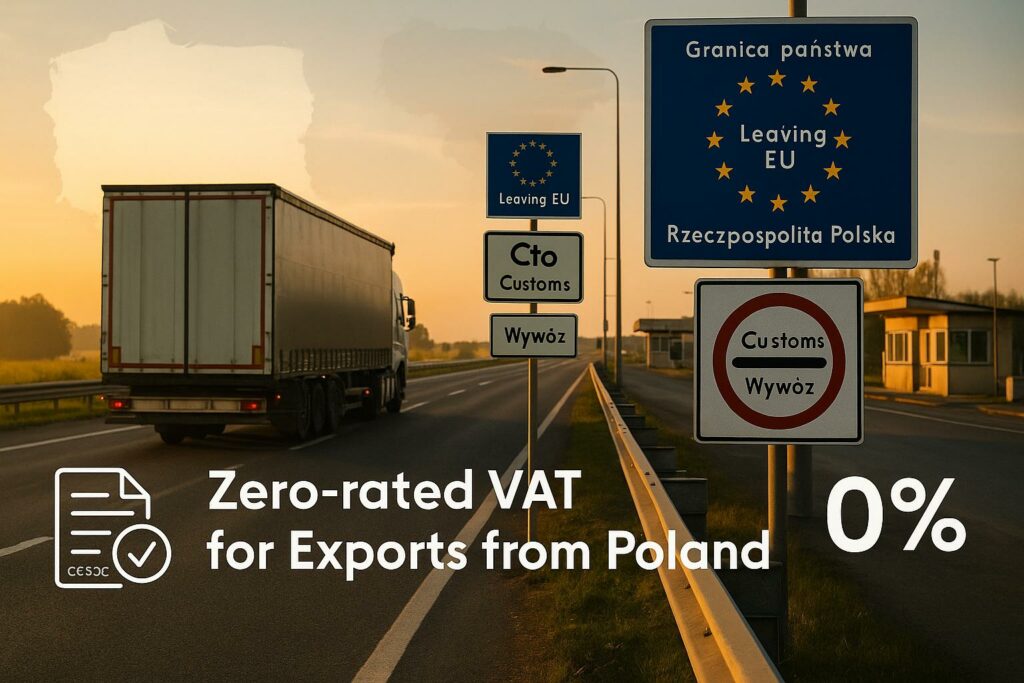Export of goods from Poland — scope and definitions
Under Polish VAT rules, export of goods means a supply where goods from Poland leave the EU customs territory:
- Direct export: goods are dispatched by the exporter (supplier) or on its behalf.
- Indirect export: goods are dispatched by a buyer established outside Poland or on its behalf.
In both cases the competent customs authorities must issue export confirmation documentation proving the consignment left the EU (the fact of export).

Customs declaration & export declaration — how to comply
From 31 October 2024, Poland introduced AES/ECS2 PLUS. In Poland, the legacy IE599 exit message was replaced by CC599C, which confirms the export and contains key data (MRN, date of exit, declaration data). Export declarations submitted in another EU state may still generate IE599—valid evidence if authenticity is ensured. File correct and complete documentation: the customs declaration, declaration data, and any end-use or safeguard statements, where required by EU regulations or destination-country rules.
Documents for export — what proves the fact of export
Polish law (Art. 41(6) and (6a) VAT Act) requires possession—before the filing deadline—of a document confirming export. The statute lists three typical categories (electronic message from the export system or its confirmed printout; electronic document received outside the system with ensured authenticity; paper export declaration or its confirmed copy). The list is open, but authorities consistently emphasize official customs confirmations.
Keep export confirmation documentation from customs (official documents only). The list below is practical and audit-ready.
Table — documents for export (evidence for 0% VAT)
| Evidence | Origin/system | What it proves | When to use |
| CC599C (Poland, AES/ECS2 PLUS) | Polish customs IT | Document confirming the export of goods from the EU; shows MRN and date of exit | Primary proof for exports cleared in Poland |
| Othe custom document from EU customs | EU customs IT | Exit confirmation issued by another Member State | Use when clearance occurs outside Poland (ensure authenticity) |
| Customs-confirmed printout (CC599C/IE599) | Customs office | Paper document confirming the export | Where paper is required for files or by the customer |
| Paper export declaration (or certified copy) | Customs office | Customs clearance performed; certified | Exceptional flows outside IT; must be customs-stamped |
| Transport documents (CMR/AWB/BL) + packing list & invoice | Carrier/exporter | Shipment trail and goods from Poland mapping (consignment, weight, destination country) | Supports audit trail; does not replace exit confirmation |
Good practice: tie every invoice to a specific MRN and consignment; your file should make it obvious how the customs declaration relates to the taxable export outside the EU.
VAT rate for exported goods — timing ladder and corrections
- Apply 0% VAT rate in the period if you hold the document confirming the export before the filing deadline.
- If the confirmation arrives later, book the sale at 0% in the next period (if received before the next deadline).
- If still missing, charge domestic VAT temporarily; when the document confirming the export of goods arrives, adjust to 0% (the fact of export drives the final outcome).
This approach aligns the VAT compliance timeline with actual customs procedures and audit expectations of the Polish tax authorities.

Transport documents, shipment traceability, and NCTS2/transit
Transport documents (CMR/AWB/BL), packing list, and ERP/KSeF references prove shipment integrity: origin (goods from Poland), destination country, and routing. For transit movements via NCTS2, keep the T-document history and closure data; transit supports the trail but final export confirmation (CC599C/IE599) is decisive.
Russia and Belarus — EU sanctions, export controls, and prohibitions
Due to the aggression against Ukraine, the EU maintains export controls, restrictions and prohibitions affecting certain type of product and end-use connected with Russia and Belarus. Before exporting goods to any destination country with sanctions exposure:
- Screen the exporter, buyer, intermediaries, and country of destination against EU lists.
- Check whether a dual-use, export license, or other certification process is required; some items are exempt, others are conditional, some are prohibited.
- Ensure customs authorities will accept the customs declaration; non-compliance may cause detention of goods, additional costs, or seizure.
- Keep evidence that you assessed restrictions or prohibitions and satisfied safety requirements for the type of product.
Substance over form: CJEU and Polish NSA
Two pillars limit over-formalism:
- CJEU, 28 March 2019, C-275/18: Member States may not condition the export exemption solely on placing goods under a specific customs procedure when substantive conditions (actual exit) are met and undisputed.
- Polish Supreme Administrative Court (NSA), 21 July 2020, I FSK 2005/17: the key factor is the fact of export outside the EU; lack of a particular document alone should not defeat the right to 0% if exit is proven and uncontested.
Practical reading in 2025. Authorities acknowledge an open evidence concept, but in day-to-day audits they continue to expect official exit confirmations (now typically CC599C in Poland, or IE599 or other from EU customs administration), or their customs-certified equivalents. Where the fact of exit is clear from the file (e.g., full customs trail, logistics records, carrier evidence, MRN history, border exit scans), these rulings support defending 0% even if the file lacks a specific labelled form—yet exporters should still build files around official confirmations to avoid disputes.
Exporter’s checklist — from declaration to VAT filing
- Identify the flow (direct or indirect export); confirm competent customs office.
- Prepare the customs declaration (data quality, declaration codes, country of destination).
- Align transport documents (CMR/AWB/BL), packing list, and invoice with the declaration.
- After leaving the EU, obtain CC599C (Poland) or IE599 (other EU customs) that confirms the export and contains the exit details.
- Book the sale with 0% VAT if the document confirming the export is on file before the deadline; otherwise apply the timing ladder.
- Screen for export controls (Russia/Belarus and other regimes); obtain any export license needed.
You can find more information here : https://www.biznes.gov.pl/pl/portal/00375

